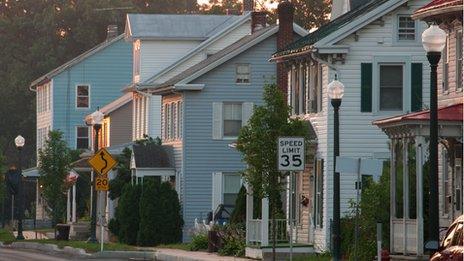US 'in denial' over poor maths standards
- Published

Lost direction: Rusting emergency vehicle used in the 1970 protests at Jackson State College, Mississippi
The maths skills of teenagers in parts of the deep south of the United States are worse than in countries such as Turkey and barely above countries such as Chile and Mexico.
An international study of maths ability in the US shows how individual states would have performed if they were ranked against other countries, using the OECD's Pisa results as a benchmark.
The study also shows that privileged youngsters in the US, with highly-educated parents, are lagging behind similar youngsters in other developed countries, external.
This analysis, from academics at Harvard and Stanford in the US and Munich University in Germany, punctures the idea that middle-class US pupils are high achievers.
Southern states Mississippi, Alabama and Louisiana are among the weakest performers, with results similar to developing countries such as Kazakhstan and Thailand.
West Virginia is also among the group of lowest performers, where maths levels are far below western European countries or high-performing Asian education systems in South Korea or Singapore.
The US has been a mediocre performer in international education tests, based on average performance across the country, but this study shows how this average conceals a remarkably wide range of successes and failures.
Northern lights
There is a band of high achieving states across the north of the US, where maths results would be as good as many successful European and Asian countries.

There is a complacency about mainstream US education standards, says study
If Massachusetts had been considered as a separate entity it would have been the seventh best at maths in the world.
Minnesota, Vermont, New Jersey and Montana are all high performers.
But there is a long tail of underachievement that dips well below the levels of secondary school pupils in wealthier western European countries. It dips into levels closer to the developing world.
New York and California are similar in ability to countries such as Bulgaria, Romania and Turkey, well below the averages for the US and OECD industrialised countries.
There are 23 US states which would be ranked below 30th place in an international ranking of 34 OECD countries at maths.
The study also overturns the idea that middle-class children in the US are as good as their international counterparts.
It shows that in the US, as in other countries, children from better educated, wealthier families will achieve better results than poorer children.
Among children of parents with a low level of education, only 17% were proficient in maths, compared with 43% of children from well-educated families.
Falling behind
But this standard of maths among well-educated families in US is well below their counterparts in other countries.
In Poland, 71% of children from well-educated families were likely to be proficient in maths. In Germany, 64% of better-off children were proficient at maths and 55% in France.
Even such a poor performance was unlikely to set off alarm bells, said Paul Peterson, report co-author and professor of government at Harvard University and director of the Program on Education Policy and Governance at the Harvard Kennedy School.
"There is a denial phenomenon," says Prof Peterson.
He said the tendency to make internal comparisons between different groups within the US had shielded the country from recognising how much they are being overtaken by international rivals.
"The American public has been trained to think about white versus minority, urban versus suburban, rich versus poor," he said.
The outcome was a misleading sense of complacency about middle-class education, which always appeared to be ahead, he said.
Report authors, Prof Peterson, Eric Hanushek at Stanford University and Ludger Woessmann at the University of Munich, wrote in Education Next magazine: "Lacking good information, it has been easy even for sophisticated Americans to be seduced by apologists who would have the public believe the problems are simply those of poor kids in central city schools. "
"Our results point in quite the opposite direction," .
California down
The underachievement in some southern states was a reflection of deep-rooted historical divides and disadvantages, Prof Peterson said, such as slavery and segregation.

Massachusetts has high results by international standards
But the study raises questions about how other southern states can buck the trend, such as Texas.
Among the children of poorly educated families, Texas is a spectacularly strong performer, equivalent to sixth place in the OECD rankings, just behind Finland.
California raised another set of negative questions, said Prof Peterson, with a very low performance.
"California was historically thought to have a good education system, but it's plunged since the 1970s," he said.
It has an economy big enough to match many OECD countries, but in education comparisons it would be a lightweight, its maths performance weaker than in almost any other industrialised country.
"It's where the rubber hits the road," said Prof Peterson.
There were long-term implications from all this, he said. Industries were concentrating around areas with successful education systems. And success in education was linked to healthier and wealthier lives for individuals.
Rebecca Winthrop, director for the Center for Universal Education at the Brookings Institution, said the findings would "raise eyebrows". In particular, she thought it would be a wake-up call for well-educated parents who thought that worries about education were a problem for "other people's children".
But she said it was important to remember the great size of the country - and that even getting down to state level there were still huge underlying disparities and inequalities.
"California is in itself a huge place," she said. And any aggregate results are going to hide the gulf between schools serving the Silicon Valley super rich and the migrant poor.
Andreas Schleicher, responsible for the OECD's Pisa tests, said this study was a challenge to middle-class households who thought that debates about school standards did not apply to them.
"The general perception has typically been that this is mainly a concern around poor schools in poor neighbourhoods and so middle-class families have often not been particularly engaged in this," he said.
In the short term, he said, the US economy would be insulated against this underachievement because it still had a "strong skill base, simply because it was the first economy investing in universal education in the 1960s, and those people still make up a large part of the workforce".
But this legacy would not last forever.
"As time goes by, skill gaps will become increasingly apparent," he said.
The report authors conclude that as well as focusing on the gap between rich and poor, the US needs to pay more attention to the rear lights of their international rivals as they race away ahead of them.